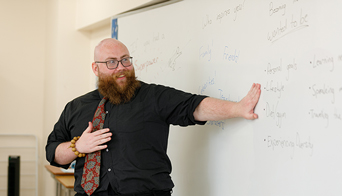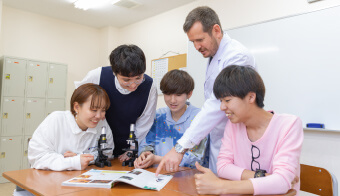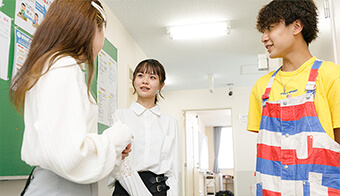ブログ
2022.06.07 先生のつぶやき
KIHSの授業を見学しました―教員を志望する大学生の視点から―
「高校の英語教員」を志望している龍谷大学4年生の荒木力忠さんが本校の授業を見学しました。
荒木さんは、本校を2019年3月に卒業し、国際学部グローバルスタディーズ学科で学んでいます。教員志望の視点から授業を見学しました。
見学した授業は次の通りです。
- Gareth Warham先生のScience(Ecology)の授業
- 安井香苗先生の英語(英語Ⅱ)の授業
- Jeff Willard先生の社会科(Geography)の授業
- 種中恵先生の英語(英語Ⅰ)の授業
- 木川梢先生の社会科(国際理解)の授業
このブログを読むと、それぞれの先生の授業の特徴がよく理解できるかと思います。ただし、ブログを英語で書いています。英文読解にチャレンジしてみてください。
国際高等課程長(教頭) 滝本武
KIHS Classroom Observation
On May 16th, 2022, I visited KIHS and observed the classes of the 1st year and 2nd year students. However, I was not mainly observing the students because I was also observing how the teachers taught the students.
In the 1st period, I observed Mr. Warham’s Ecology class that was held in English only. The way he taught the class really expanded my knowledge on how to teach students of various English proficiency level at the same time. In his class he used rhetorical questions, contextual cues, gave time to students to read the text and answer the questions, implemented lots of group discussions, and talked extremely slowly so that everyone could understand what he said. Furthermore, he used lots of hand gestures, repetition, related discussions back to what he specifically did in the previous class. What surprised me is that he told everyone in the class that he does not judge students’ English proficiency level because what he expects from the students is the fundamental understanding of the contents that students learned in the class. Also, Mr. Warham briefly explained the context on the vocabulary and phrases, then persuaded the students to write in the passive voice, to write a scientific report. However, if students could not write the report in the passive voice, he told everyone that he would not deduct any marks if students wrote the report using personal pronouns.
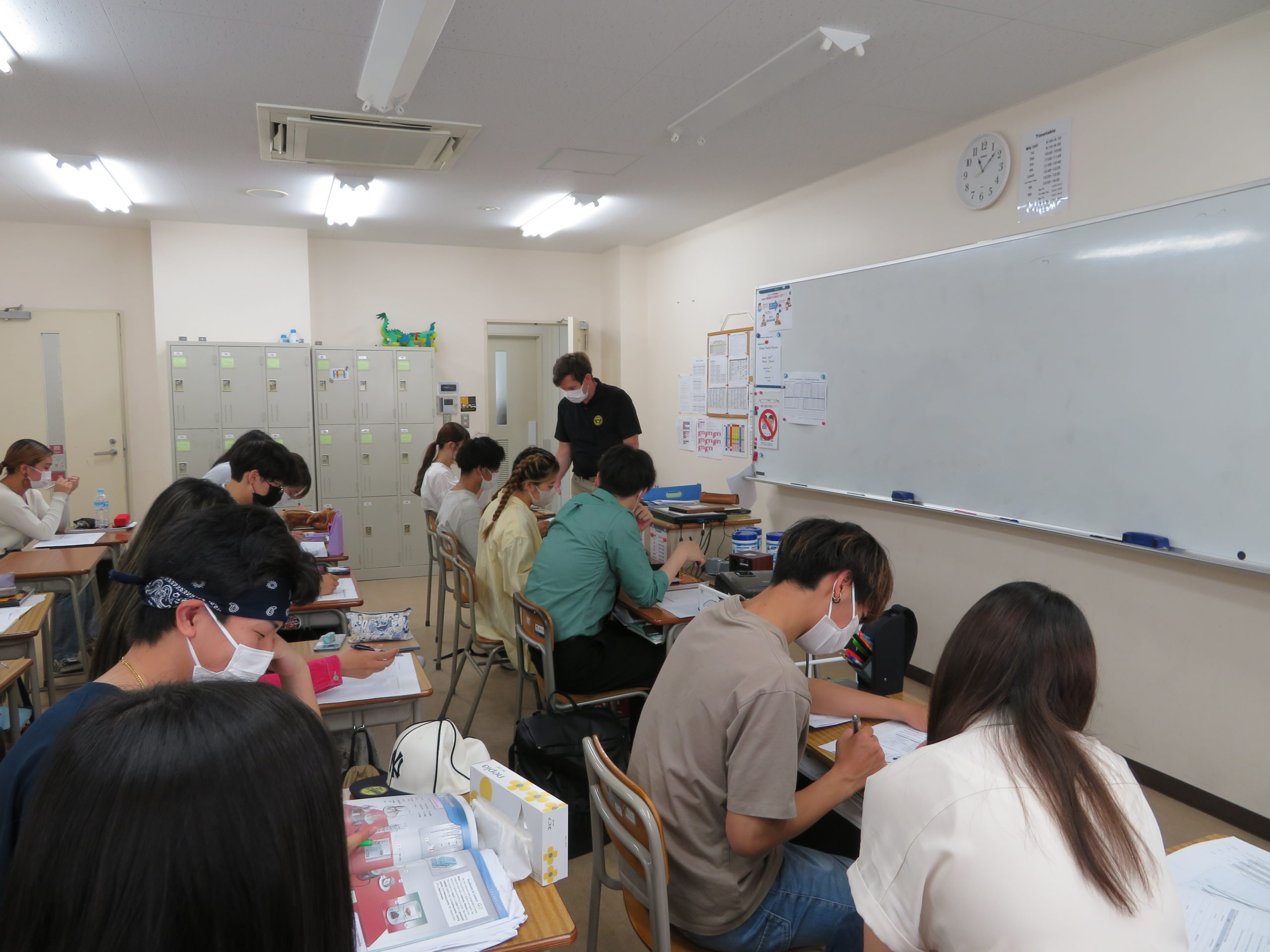
Next, I visited Ms. Yasui’s English class (英語Ⅱ). Her class was mainly focused upon grammar and she taught the class in both English and Japanese. The way she taught the class was mainly using the grammar translation method. However, what I really liked about the class was that she was making students search the meaning of the words online. As her handwriting was extremely neat, it made me realize that I must improve my own handwriting. At first, she read the sentences to the students and made the students repeat after her. Then, without looking at the paper, she made the students repeat the sentence and asked the students how many words there were in the sentence.
In the 2nd period, I observed Mr. Willard’s geography class that was also taught in only English. This class was an eye-opening experience for me. His class was free and easy going, which made the students feel comfortable to learn in class. He used lots of hand gestures and controlled his body language. By using this kind of non-verbal communication effectively, students were motivated to listen to his explanation/ story. Like in Mr. Warham’s class, Mr. Willard also spoke extremely slowly, used a lot of contextual cues, made students discuss in pairs/ in groups and related topic back to what the students had learned in the previous class. Mr. Willard included lots of jokes in the class. By doing so, it made the atmosphere of the class fun. Lastly, Mr. Willard involved a game/quiz in the class to make a more student-centered learning environment.
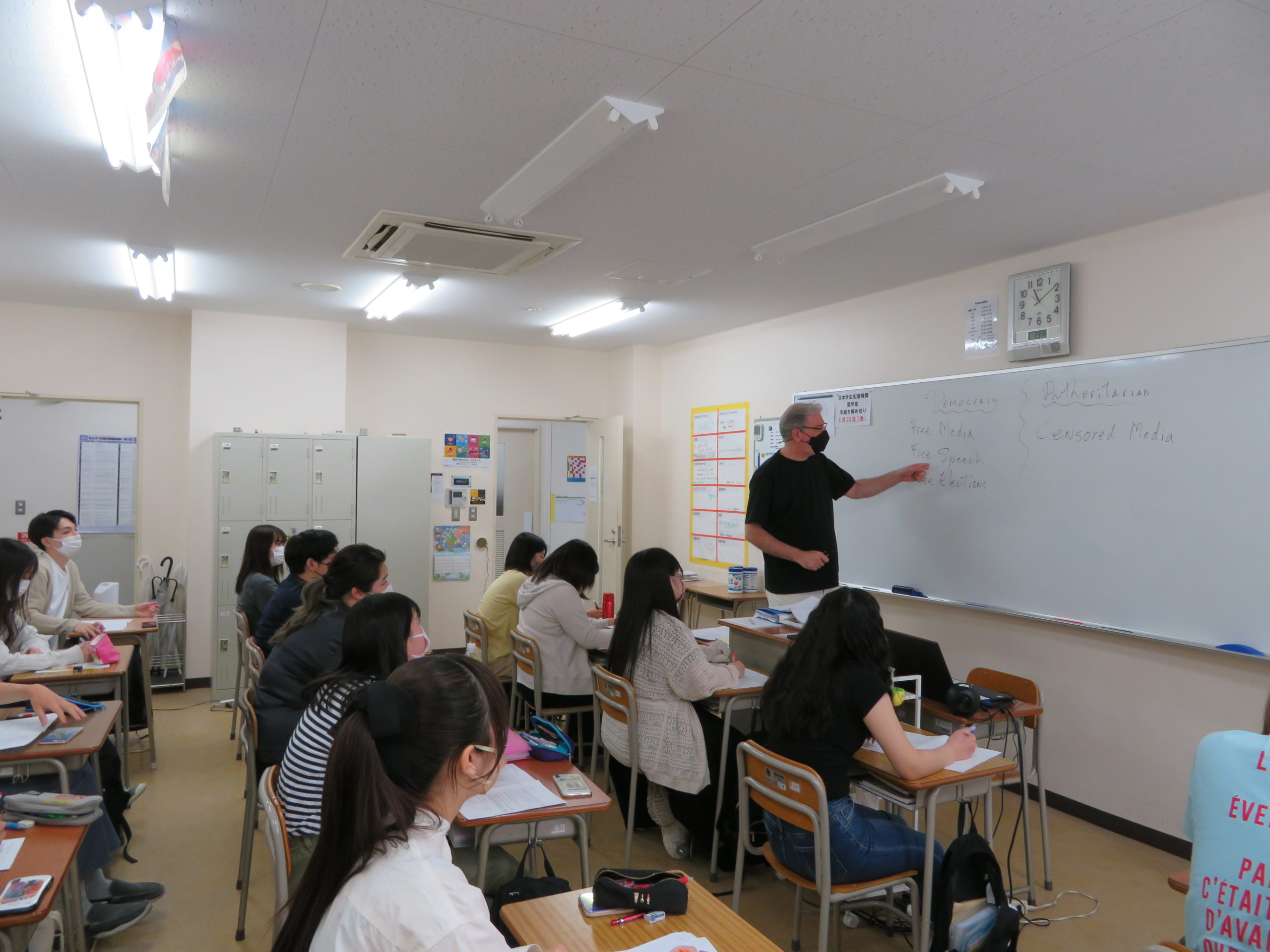
In the 3rd period, I observed Ms. Tanenaka’s English class (英語Ⅰ). She was using English and Japanese in the class so that everyone could understand what she was saying. In her class she was implementing a 5-minute English vocabulary test, which was repeated at the beginning of each class so students can expand their word bank. After the test, students were self-evaluating their test. What I really liked about her class was that she made students present in front of the class, and those watching the presentation needed to assess their classmate’s presentation in the following order (out of 20): The volume of the presenters’ voice; their originality; whether it is easy to understand or not; and, their communication approach. I felt that evaluating other students’ presentation will improve their own presentation skills, too.
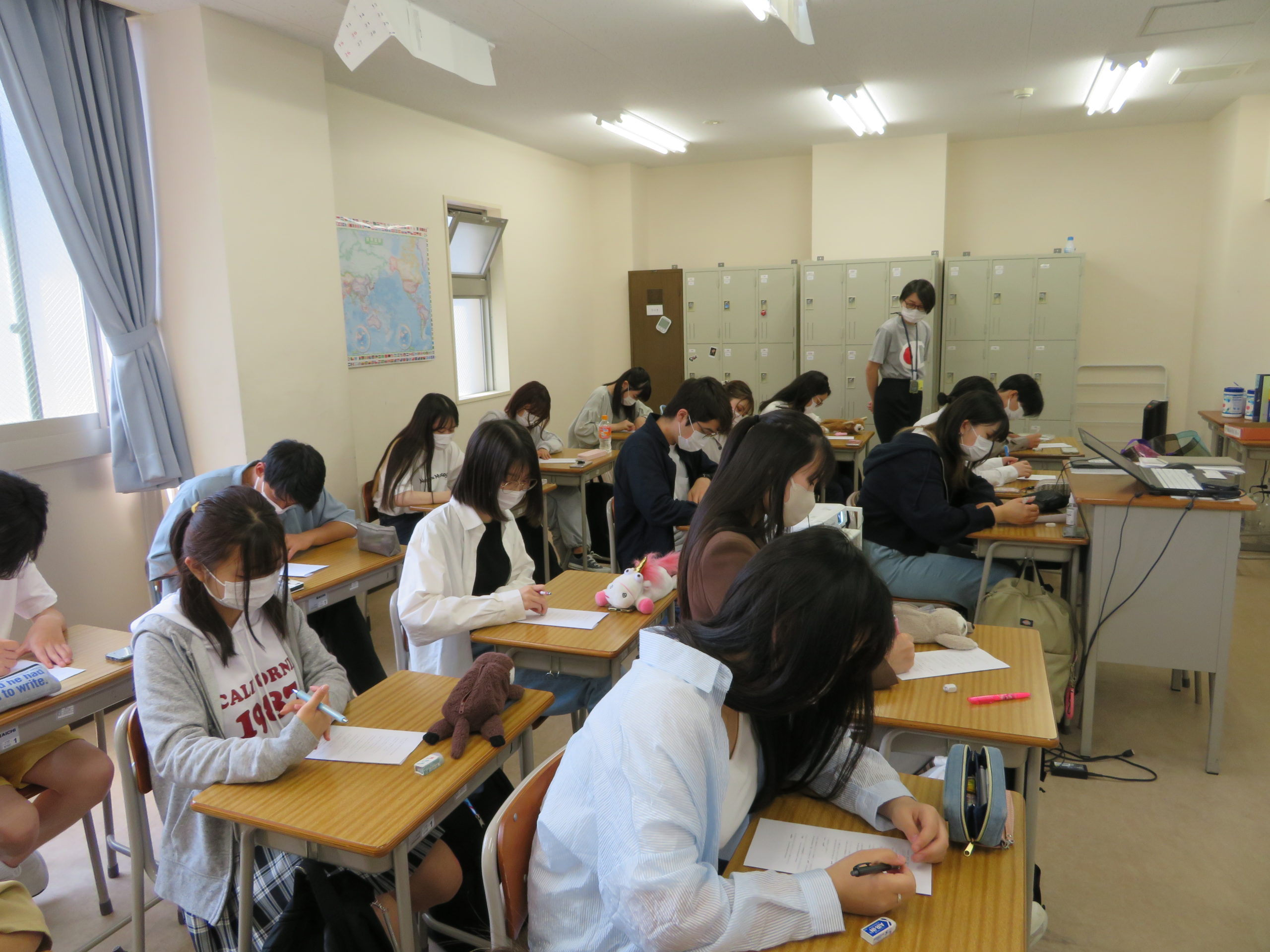
In the 4th period I observed Ms. Kigawa’s International Studies (国際理解) class, that was conducted in both Japanese and English. In her class, there were lots of group discussion activities aimed at expanding their critical thinking skills (e.g., Why should we recycle paper? How do plastic bottles harm the environment/atmosphere? and more). By giving these kinds of tricky questions to the students, it automatically made the class into a discussion or debate. Furthermore, what I really like about Ms. Kigawa’s teaching style is that she always complimented the students answer, and if students were striving to give an answer in English, she give a contextual cue or a phrase, so that students could attempt to answer in English smoothly.
My thoughts/ impression evaluating teachers’ lessons
By observing teachers’ lessons, I have learned the importance of the usage of rhetorical questions, contextual cues, hand gestures, body language, and repetition, as well as the importance of clear explanations by the teacher, talking slowly to the students, implementing games, quizzes, short tests and group discussion, to encourage student-centered learning, self-evaluation, and evaluation of others. By going back to KIHS and seeing how teachers teach, I was extremely amazed by how every teacher’s teaching style/ approach is different. Therefore, by seeing many classes it really expanded my knowledge and gave me ideas of how I should teach my students in the future.
Rikitada Araki
(Graduated KIHS in March 2019)

大阪のインターナショナルスクールなら
関西インターナショナルハイスクール
〒545-00053 大阪市阿倍野区松崎町2-9-36
帰国生・帰国子女受け入れ校
高校卒業資格取得可
タグ一覧
- AIG高校生外交官プログラム
- APU
- Australia
- BA.5
- BBQ
- Bournemouth
- CAE
- CEFR
- class
- English
- estar動詞
- FCE
- George Bernard Shaw
- graduation ceremony
- GTEC
- GUP
- Halloween
- HOMESTAY
- HSDJapan
- IELTS
- LESSON
- Listening
- Manual Rios
- MOJO
- MUN
- MySOS
- NISA
- OECD
- PCR検査
- SDGs
- Semana Santa
- ser動詞
- SNS
- Society3.0
- Society4.0
- Society5.0
- Speaking
- Speech Contest
- TCK
- Third Culture Kid
- TOEIC
- USJ
- VRoid
- WFPチャリティーエッセイコンテスト
- WFP賞
- World History
- アイデンティティ
- アジア学院
- アバター
- アルゼンチン
- イカゲーム
- イギリス
- イクサガミ
- インタビュー
- インテックス大阪
- エディオンアリーナ大阪
- オーストラリア
- オーストラリア入国
- オーストラリア出国
- おおさかグローバル塾
- お笑い文化
- お金の勉強
- キューズモール
- クイズ大会
- グラバー園
- クリスマス
- グローバル
- グローバルスタディーズ
- グローバル化
- ケンブリッジ英検
- コミュニケーション力
- ごみ問題
- コロナ
- コロナ禍
- コンテスト
- サーフィン
- サッカーコーチ
- シーカヤック
- ジェンダー
- シドニー
- スキー
- スキー研修
- スクーリング
- ストーリーテリング・コンテスト
- ストレス
- スノボ
- スピーチコンテスト
- スペイン語
- スポーツ大会
- セレッソ大阪
- ソーシャルメディア研究会
- ダンス
- ダンスレッスン
- チュニジア
- デジタル
- ドイツ
- ドッジボール
- トラウマ
- バイロンベイ
- ハウステンボス
- ハロウィン
- パンフレット
- ピクトグラム
- フードロス問題
- フィールドスタディ
- フィンランド
- プレゼンテーション
- ペンギン水族館
- ホームステイ
- ホームルーム
- ボーンマス
- ホストファミリー
- ボランティア
- ボランティアサークル
- ボランティア参加
- マネーリテラシー
- マレーシア
- ランナー
- リーズ大学
- リーダー
- リレー
- ワークショップ
- 一般入試
- 世界史
- 世界経済フォーラム
- 中間試験
- 乗馬
- 九十九島
- 交流会
- 京都外国語大学
- 京都大学
- 今村翔吾
- 他者認識
- 体育
- 体育大会
- 併修
- 併修校
- 使える英語
- 保健室
- 先生の言いたいこと
- 先生紹介
- 入国制限
- 入学式
- 八本目の槍
- 公募制推薦入試
- 出張授業
- 分野別説明会
- 副学長
- 動物園
- 医療
- 卒業式
- 卒業生
- 南海トラフ大地震
- 台湾
- 台湾の大学
- 台湾留学
- 合格実績
- 合格状況
- 同志社大学
- 図書委員
- 国際協力
- 国際学部
- 国際理解
- 在日米国大使館助成プログラム
- 地震
- 城
- 塞王の楯
- 外国語
- 多国籍
- 大学
- 大宰府天満宮
- 大浦天主堂
- 大阪マラソン
- 大阪万博
- 大阪府知事賞
- 大阪府立体育館
- 太宰府天満宮
- 学校生活
- 学校給食支援
- 学習
- 安藤百福名誉博士奨励賞
- 定期試験
- 就職
- 就職内定
- 岸田首相
- 帰国生
- 心理学
- 志賀高原
- 思春期セミナー
- 投資信託
- 授業
- 授業参観
- 推薦入試
- 損害賠償金
- 文学
- 文科省
- 新入生交流会
- 新学期
- 新年度
- 旅行・観光開発ランキング
- 日本グローバル教育学会
- 期末試験
- 未来構想キャンプ
- 株式投資
- 桜花学園大学
- 模擬国連
- 模擬国連大会
- 模擬国連大阪
- 歯科衛生士
- 水危機
- 水族館
- 法律
- 海外
- 海外の大学
- 海外大学受験講座
- 海外留学
- 海外研修
- 渡航
- 災害
- 特別講師
- 玉入れ
- 環境問題
- 生きがい
- 生きた英語
- 生徒会
- 留学
- 直木賞
- 短期留学
- 石垣
- 石田三成
- 研修
- 研修会
- 研修旅行
- 社会貢献
- 神奈川歯科大学
- 稲佐山
- 立命館アジア太平洋大学
- 竹内義博
- 第七波
- 綱引き
- 総合型推薦入試
- 総合型選抜入試
- 緩和
- 美術
- 翻訳
- 自己理解
- 自己認識
- 自習
- 芸術鑑賞
- 英検
- 英語
- 英語レベル分け試験
- 英語教員
- 英語教育
- 英語教育実施状況調査
- 褒めニケーション
- 試験
- 語学学校
- 語学研修
- 課外活動
- 講演
- 講演会
- 賤ヶ岳の七本槍
- 通訳
- 進学
- 進路
- 進路指導
- 進路説明会
- 道程
- 選択必修科目
- 長崎
- 長野県
- 関西外語専門学校
- 防災研修
- 防犯防災総合展2022
- 阿倍野
- 陰性証明
- 集中科目
- 風頭公園
- 飛田匡介
- 食品ロス問題
- 高村幸太郎
- 高校
- 高校生ボランティアアワード
- 高校生支援
- 龍谷大学

